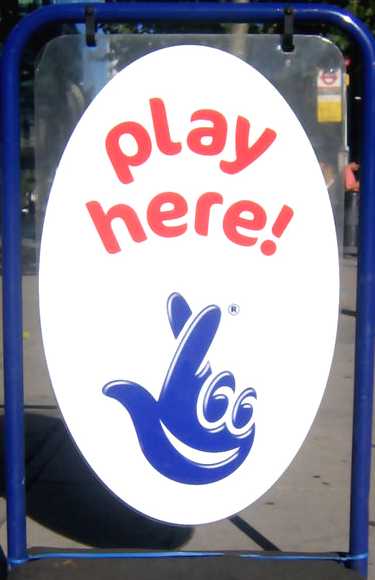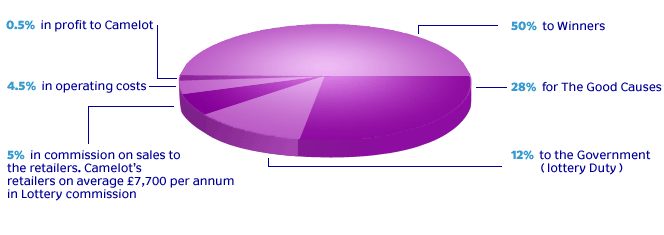|
The
National Lottery is the United
Kingdom's largest lottery. It is operated by Camelot
Group, to whom the franchise was granted in 1994 and
again in 2001. The lottery is regulated by The National
Lottery Commission. The National Lottery undertook a
major rebranding programme in 2002 designed to combat
falling sales. This resulted in the main game being
renamed Lotto. However, the games as a collective
are still known as The National Lottery. It is
one of the most popular forms of gambling in the UK.
All
prizes are paid as a lump sum and are tax-free. Of every
pound
spend on Lottery games, Camelot receives 4.5 pence to
cover operating costs and 0.5p profit, 50p goes to the
prize fund, 28p to good causes, 12p to Government and 5p
to retailers as commission.

Games
Several
games operate under the National Lottery brand:
Lotto
Six
numbers are drawn from a range of 1–49, as well as a
further bonus ball. Players choose six different
numbers. Prizes are awarded for three to six matches of
the six, along with five matches and a match for the
bonus ball. Anyone matching all six balls wins the
jackpot; the chance of doing so is 1 in 13,983,816
(assuming the drawing of the balls is completely random
so that all possible combinations have an equal chance
of occurring). The price for a ticket is £1.
The
draw is conducted on Wednesdays and Saturdays. Saturday
draws started on November 19, 1994, under the name
'National Lottery'. The first Wednesday draw was on
February 5, 1997. All draws are shown live on BBC One in
the UK, with the Saturday draw shown as a segment in a
range of different Lottery branded gameshows throughout
the year.
The
game was rebranded 'Lotto' in 2002.
Camelot
state that 3 ball prize winners are calculated first,
this is normally £10, the remaining prize fund is then
divided as shown in the table below and split equally
with the number of winners for each selection:
|
Match
|
Prize
|
Odds
of winning
|
|
3
numbers
|
£10
|
1:
57
|
|
4
numbers
|
2%
of remaining fund
|
1:
1,033
|
|
5
numbers
|
10%
of remaining fund
|
1:
55,492
|
|
5
numbers and bonus ball
|
16%
of remaining fund
|
1:
2,330,636
|
|
6
numbers
|
52%
of remaining fund
|
1:
13,983,816
|
Lotto
Extra
Launched
on 13 November 2000, players playing the main Lotto draw
have the option to enter the Lotto Extra draw at the
same time with the same six numbers. The price for
including Lotto Extra on a ticket is an additional £1/entry
— it is not possible to play Lotto Extra separately.
Six numbers are drawn from a range of 1–49. If you
match all six balls you win the jackpot; the chance of
doing so is 1 in 13,983,816. There are no other prizes.
If no one matches all six numbers the jackpot rolls over
until it is won or reaches £50 million, when, if no one
matches all six then the prize will roll down to players
matching five, if none then four, if none then three,
etc.
The
draw is conducted on Wednesdays and Saturdays. All
Saturday draws are shown live on BBC 1 in the UK,
immediately after the main Lotto draw, whereas due to
lack of time on Wednesday draws, just the pre-selected
winning numbers are displayed onscreen after the Lotto
draw.
The
game was rebranded 'Lotto Extra' from the launch name of
'Lottery Extra' at the same time as the main game.

"Play
here!" sign outside a newsagent, incorporating the
National Lottery's stylised hand with crossed fingers
logo
Lotto
Hot Picks
Lotto
Hotpicks also uses the main Lotto draw for its numbers,
but differs in how the players' numbers are chosen.
While in both Lotto and Lotto Extra six numbers are
chosen and prizes are available on partial matches, in
Hot Picks the player chooses fewer numbers, but must
match all of them to win. The odds and payouts are as
follows
|
Match
|
Prize
|
Odds
of winning
|
|
1
number
|
£5
|
1:
9
|
|
2
numbers
|
£40
|
1:
79
|
|
3
numbers
|
£450
|
1:
922
|
|
4
numbers
|
£7,000
|
1:
14,126
|
|
5
numbers
|
£130,000
|
1:
317,814
|
Thunderball
Thunderball
was launched on June 7, 1999. Players pick five main
numbers from 1 to 34 and one 'Thunderball' number from 1
to 14, for an entry fee of £1.00. Draws currently take
place every Saturday and Wednesday. The first mid-week
Thunderball was on October 17, 2002.
|
Match
|
Prize
|
Odds
of winning
|
|
1
+ Thunderball
|
£5
|
1:
33
|
|
2
+ Thunderball
|
£10
|
1:
107
|
|
3
numbers
|
£10
|
1:
74
|
|
3
+ Thunderball
|
£20
|
1:
960
|
|
4
numbers
|
£100
|
1:
2,067
|
|
4
+ Thunderball
|
£250
|
1:
26,866
|
|
5
numbers
|
£5000
|
1:
299,661
|
|
5
+ Thunderball
|
£250,000
|
1:
3,895,584
|
Scratchcards
As
well as draw tickets, the National Lottery sells
(through newsagents, supermarkets, and so on)
scratchcards.
These
are small pieces of card where an area has been covered
by thin layer of opaque (and usually designed according
to the particular card) latex, but can be scratched off.
Under this area are concealed the items/pictures that
must be 'found' in order to win.
The
generic scratchcard requires the player to match three
of the same prize amounts. If this is accomplished, they
win that amount, the highest possible being £100,000.
Other scratchcards involve matching symbols, pictures or
words.
The
majority of National Lottery scratchcards are sold for
£1. Larger scratchcards with two or more chances to win
or a larger than usual maximum cash prize, i.e. £250,000,
cost £2.
EuroMillions
On
Saturday 7 February 2004 the lottery organisation
Camelot launched a pan-European
lottery: EuroMillions. The first draw took place on
Friday 13 February 2004 in Paris. The UK, France
and Spain
were involved initially. Lotteries from Austria, Belgium,
Ireland, Luxembourg, Portugal and Switzerland
joined the draw on 8 October 2004 and the draws are
currently made in Switzerland.
Olympic
Lottery
Following
the success of London's bid to host the 2012 Summer
Olympics, Olympic Lottery Scratchcards were launched on
27 July 2005 under the brand name "Go for
Gold". 28p of the price of £1 goes to the Olympic
Lottery Distribution Fund, and the scratchcards are
intended to raise £750 million towards the cost of
running the games.
Good
Causes
The
National Lottery has so far raised £17 billion pounds
for good causes, a programme which distributes money via
grants. 28% of lottery revenue goes towards the fund,
along with all unclaimed prizes. Additionally, 12% goes
to the state. The prize fund is 45% of revenue, with the
remaining 15% going towards running costs and profits
for the lottery organisers and ticket sellers.
The
distribution of money to good causes is not the
responsibility of the operator (Camelot). It is the
responsibility of The National Lottery Distribution Fund
(NLDF), administered by the government Department for
Culture, Media and Sport.
WHERE
THE MONEY GOES

Total
National Lottery revenue is broken down as follows. This
breakdown is based on sales outlined in Camelot's bid
for the second licence:
Camelot
is not responsible for the allocation or distribution of
Lottery funds
Out of every £1 spent on the National Lottery, around
28p goes to Good Causes. In the last year this was
distributed as follows:
Health, Education, Environment, Community & Charity
50%
Sports 16.67%
Arts 16.67%
Heritage 16.67%
Over £18 billion has been raised for Good Causes to
date. Read the latest Good
Causes stories to find out about recent
beneficiaries of Lottery funding and the difference it
has made. Please note, although Interactive channels,
such as the website and Digital TV, do not incur
retailer commission, they do incur increased operating
costs e.g. bank transactions, registration fees and
technology. For further information on Good Causes,
please visit www.lotterygoodcauses.org.uk.
Unclaimed
prizes
Winning
tickets must be claimed within 180 days of the draw
taking place. If a prize is unclaimed within that time,
it is distributed through the Lotto's Good Causes fund.
This highest unclaimed prize distributed this way to
date was a winning ticket worth £9,476,995, which
expired at 17.30 GMT on Monday, 2 January 2006 [1].
This ticket was the 24th prize in excess of one million
pounds to be unclaimed.
CONTACTS:
The
National Lottery
PO Box 1010
Liverpool
L70 1NL
www.national-lottery.co.uk
National Lottery Line: 0845 910 0000; 0845 910 0045 (Minicom
facility)
National Lottery Subscriptions: 0845 912 5000
Interactive player enquiries: 0845 278 8000
Retailer enquiries
Retailer Hotline: 0800 0649 649
Telesales (Scratchcards Ordering Line): 0845 9666768
Media enquiries
Camelot Press Office: 020 7632 5711 (24 hour press
office)
Company addresses
Watford, Head Office and Regional Centre Camelot Group
plc,
Tolpits Lane, Watford, Herts,
WD18 9RN
Tel: 01923 425000
Other Regional Centres:
Belfast
Lombard House, 10-20 Lombard Street,
Belfast, BT1 1RD Tel: 02890 239063
Cardiff
Willow Court, The Orchards,
Ty-Glas Avenue, Llanishen,
Cardiff, CF14 5DZ
Tel: 02920 689625
Glasgow
Locard House, Linnit Way,
Strathclyde Business Park, Bellshill,
North Lanarkshire, ML4 3RA
Tel: 01698 845666
Liverpool
3b Olympic Way, Sefton Business Park,
Aintree, Liverpool , L30 1RD
Tel: 0151 236 1796
Good Cause information:
National Lottery Promotions Unit
www.lotterygoodcauses.org.uk
Tel: 020 7211 3991
General
enquiries and assistance: help@national-lottery.co.uk
Unhappy
about our service? complaints@national-lottery.co.uk
|

CHERRY
AFFORDABLE PASSIVE HOMES UK
|
LINKS:
National
Lottery in the news
|



